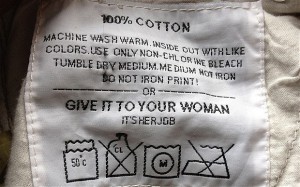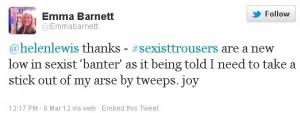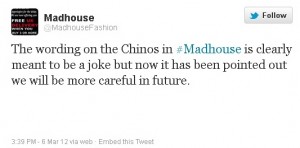This month we bring you a selection of international failure.
One thing that we try to emphasis in our social media crisis training is that brands cannot isolate offline events from spreading to the virtual realm. It just takes one funny picture, one careless sentence in an interview or one bad business decision – soon they’ll be uploaded and shared around social media channels. Before you know it that one small mistake made in one small area of the world is trending on Twitter and it seems like everyone is attacking your brand.
All brands, no matter how much they use social, should ensure that they have a team of people who are ready to respond quickly and appropriately should the brand come under attack.
In March, Australian food retailer Coles committed the now classic faux pas of daring to ask Twitter followers to “Finish this sentence”. These things never end well – especially when you already have people campaigning against the brand. Coles, for example, is at the centre of a protest about the prices the brand offers to farmers. Of course people are going to take this chance to stick it to the brand that they have a beef with.

There were enough funny responses to create a storify page, which included attacks about the brands policy on other issues.
But it’s okay, because Coles was quick to respond. After an hour it tweeted:
It took one hour for Coles to make itself look monumentally out of touch with its customers and their concerns – the brands response did nothing to repair the damage that had been done.
Which takes us to the Canadian bust bus.
Yes, you read that right.
Pity the poor electoral candidate whose campaign team failed to “proof” the all-important campaign bus. Okay, so they spelt her name right, but surely someone on the team has a juvenile sense of humour?
Now, I’m not claiming that this is a major crisis, but if you were running for election would you want your news cycle dominated by people virtually laughing at your bus design? Someone snapped a picture of the bus, which made its way to Twitter, and eventually the major news channels:
If there’s one thing about political campaigns it’s that they respond quickly to this kind of thing. The team emphasised how unimportant this kind of thing was, but said that it was distracting from their issues and it would be changed. (That didn’t stop Leno having some fun with it though – so you could argue that the candidate got some excellent free publicity!)
Meanwhile over the border, another electoral candidate has been facing ridicule as a result of a comment made by a senior aid during a television interview. Mitt Romney handed his rivals the following perfect quote for their campaign ads:
Interviewer: “Is there a concern that Santorum and Gingrich might force the governor to tack so far to the right it would hurt him with moderate voters in the general election?”
Eric Fehrnstrom: “Well, I think you hit a reset button for the fall campaign. Everything changes. It’s almost like an Etch A Sketch. You can kind of shake it up and we start all over again.”
This inspired many a social parody regarding how he’ll completely change his opinion on major issues in the Fall – video, photo, Twitter, protests and much more. It also earned him the nickname of the “Etch-a-Sketch candidate”. Rival candidates Rick Santorum and Newt Gingrich were even seen handing out Etch-a Sketches at campaign stops. Even protestors started showing up with them.
It has, however, not been too bad for Etch-a-Sketch sales figures – which have gone through the roof.
When President Obama ran for office many credited the campaigns use of social media as a major factor in his victory. Politicians cannot ignore social media, especially during a campaign. Okay, so a funny video or a tweet isn’t going to make a Democrat vote Republican, or visa-versa, but a social media trend of mocking a candidate could help shift the perception of Republican voters trying to choose which candidate they want to run for President.
Another brand that has felt the wrath of social this March was Red Bull. It decided that it would be a fun, creative idea to make an amusing advert about Jesus. It started its on air run on the 14th in South Africa.
The ad was a (supposedly) humorous take on the tale of Jesus walking on water – you see, it wasn’t because he was the son of God and able to perform miracles and such, but because Red Bull gave him wings.
The next day the ad was unceremoniously yanked from air in response to calls from the Church, criticism made via social media and complaints to the South African ASA (who ruled in favour of the complainants and ordered Red Bull to screen the ruling which would be run in place of the original ad).
Red Bull’s response was to say that it “It is never our intention to hurt anyone’s feelings,” and that its adverts were always about “well-known themes.” This is one of those incidents where a brand created the problem all by itself, by showing a lack of culture and religious awareness. Perhaps its target audience wouldn’t find the advert offensive, but TV ads don’t just reach a brands target audience. Any one taking the time to consider the theme of the advert should have come to the conclusion that it would prove offensive to some people – but they aired it anyway.
My personal “favourite” fail of the month originates right here in the UK. It all begins with a pair of sexist trousers.
Unfortunately for men’s clothing retailer Madhouse, a pair of their sexist chinos ended up in the hands of the very un-amused Digital Media Editor of The Telegraph, who tweeted the picture and then reported on it.
The #sexisttrousers hashtag did the rounds on Twitter as people debated if it was or was not funny or sexist (or both or neither). People argued and it wasn’t pretty – at one point sticks were accused of being up certain people’s backsides…
Yes. Heaven forfend someone call the brand up on their sexist washing instructions. Anyway, I digress. The brand responded to the growing #sexisttrousers trend by saying that it had been unaware of its existence and then took to Twitter and said it was meant to be a joke – although obviously not one designed by them to get free PR. No sir ree.
If it was intentional – and if the brand says it wasn’t then who are we to argue – it’s a risky move. Okay, some of their potential customer base will find it funny – but it runs the risk of alienating more people than it wins over. If it wasn’t intentional then one would think that the brand would get rid of the toxic stock asap and apologise for stocking something so stupid.
One common trend when mistakes start to trend on social media is those that claim that the brand, politician, celebrity etc deliberately did whatever they did as a PR stunt – they wanted to generate controversy, to get air time on Leno or mentioned in the Telegraph. It could be true – lord knows there are some balmy people out there – but any PRO worth their salt would advise a client that truckloads of coverage isn’t much use to you if it’s making you look like an idiot.














